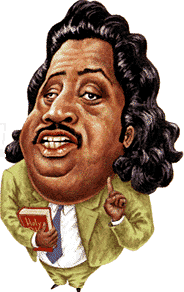|
|

Jewish World Review / July 21, 1998 / 27 Tamuz, 5758
Clarence Page
WASHINGTON -- Al Sharpton dared Steven Pagones to "sue us." What happened next offers a lesson to anyone who lets their mouth write checks that their evidence can't cash.
The case quickly turned into one of the most explosive and divisive racial eruptions of our time.
A grand jury in 1988 concluded Brawley's claims were a hoax, concocted to account for her whereabouts to a hot-tempered stepfather. The jury specifically exonerated Pagones. Yet, Sharpton refused to back down.
"We stated openly that Steven Pagones did it," Sharpton said. "If we're lying, sue us, so we can go into court and prove it."
That day has come and gone. Last week (on July 13), A jury found seven such statements Sharpton made in the late 1980s to be defamatory of Pagones. Two co-defendants, disbarred attorneys Alton Maddox and Vernon Mason, were found similarly liable on three counts.
But don't look to Rev. Al for contrition. Facing me and three other African-American journalists on the Black Entertainment Television (BET) cable TV news-panel program, "Lead Story," Sharpton wriggled out of every attempt we made to nudge him toward saying he was sorry.
"I may have tried to do things better," he said, when asked if he would do anything differently.
Does he still stand by his controversial statements?
"I stand by, as her spokesperson," he said, hesitating only slightly, "that, based on her charges, Steven Pagones should have been arrested and prosecuted."
Unfortunately for Brawley's "advisors," as the trio called themselves, they failed to produce anything of substance to back up her charges. Sharpton didn't even get details directly from Brawley. He only got second-hand accounts from her mother and others because he didn't want to be "talking sex with a 15-year-old girl," he said.
But that shouldn't matter, he insisted. Pagones, in Sharpton's view, should be charged based on Brawley's word alone.
"The reason I was involved was that for some reason they would not move forward based on the word of this victim. You cannot have different standards for different victims. I still say based on grand jury testimony that Stephen Pagones should have been arrested and prosecuted and a jury (allowed to) decide on his guilt."
But the accused do have rights, too, regardless of their race or gender. That was said many times of O.J. Simpson, whose rights Sharpton valiantly defended, and it must be said of Steve Pagones. The burden of proof lies with the accusers. It is a heavy burden that relies on more than rhetoric, especially racial rhetoric.
Otherwise, if you reverse the races in the Pagones scenario, you have the notorious Scottsboro case of the 1930s all over again. That trial of nine black youths in Scottsboro, Ala., on trumped-up charges of raping two white women, galvanized public opinion about Southern racial oppression and became a national cause celebre.
In 1937, after two trials, four defendants were freed and the rest received long prison terms. The last was not freed until 1950, helping set the stage for civil rights crusades to come.
Americans have made a lot of racial progress since those days, although we still have a long way to go to bridge our racial divides. We have choices. We can apply justice equally or we can play racial payback, presuming white men to be guilty until they prove themselves innocent.
Widely seen a decade ago (and lampooned in Tom Wolfe's "Bonfire of the Vanities") as a racial hustler, Sharpton has moderated his approach to appeal to white voters in his unsuccessful, so far, bids for public office. He has publicly forgiven a white man for stabbing him, an incident that he says inspired his newfound moderation.
But the Brawley case haunts him. He has painted himself into a corner with his own overheated racial rhetoric. By standing fast, he reveals his moderation to be a hot-air front.
Still, Sharpton predicted he and his co-defendants will win their appeal and that his future as a sometime political candidate remains viable. We black folks are a forgiving people, he reminded us.
"We're sitting in a city where (the voters) forgave a man for smoking crack on TV," he said, obviously referring to District of Columbia Mayor Marion Barry.
If that's the best role model Sharpton can produce, he's in worse trouble than I thought.
 Calling Rev. Al's bluff
Calling Rev. Al's bluff
Sharpton's challenge came in the midst of the notorious Tawana Brawley affair a decade ago. A 15-year-old black girl in upstate New York claimed a gang of white men, including Pagones, a local prosecutor, raped her, scrawled racial epithets on her torso and left her in a rubbish bag with dog excrement.

At least Tawana has
somebody that believes her

7/16/98: Child porn vs. Internet rights; drawing fine lines
7/13/98: Still partners after all these years
7/8/98: A future without 'unknown' soldiers
7/6/98: Suddenly Drudge doesn't look so bad
7/1/98: Get off your, uh, couch, America!
6/29/98: Have conservatives won the media game?